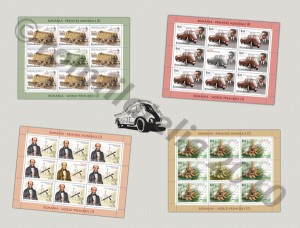 Over time, the Carpathian-Danubian-Pontic region has given outstanding personalities in the field of creativity, inventics, science and universal culture.
Over time, the Carpathian-Danubian-Pontic region has given outstanding personalities in the field of creativity, inventics, science and universal culture.
It is enough to enumerate just a few: Dimitrie Cantemir, Hermann Oberth, Spiru Haret, Petrache Poenaru, Anghel Saligny, Emil Racovita, Grigore Antipa, Traian Vuia, Henri Coanda, Ioan Cantacuzino, Nicolae Paulescu, Stefan Odobleja, Gogu Constantinescu, Constantin Brancusi, George Enescu, Emil Cioran, Mircea Eliade, George Emil Palade and also the illustrious anonymous who contributed to mankind’s progress.
Starting this year, in order to promote the genuine national values of international level, Romfilatelia inaugurates the cycle of postage stamps issues entitled “Romania – World premieres (I)”
The first series illustrates the inventions: the horizontal wheel mill, the mining coach from Brad mine, the fountain pen and the aerodynamic automobile.
The horizontal wheel mill has been considered the “queen of the artisanal hydrotechnical installations” on the Romanian territory whose use was mentioned ever since the 13th – 14th centuries. On a vertical axle there are the ladle-shaped blades giving the system a supplementary force due to the appearance of a reactive jet. It was used in the areas where the water fallings had a low flow. Starting from the constructive principle of the “horizontal wheel mills”, the American engineer Lester Allen Pelton invented the turbine which bears his name.
The original exemplars of the horizontal wheel mill may be seen at the Museum of Masterpieces of Science and Technology in Vienna and “Dimitrie Leonida” Technical Museum in Bucharest.
The wodden mining coach from Brad – Barza gold mine (16th century) has been considered as the first vehicle on rails in the history of technology having a switch.
An original exemplar of this coach may be seen at the Museum of Transports in Berlin and a copy of it may be seen at the Railway Museum and “Dimitrie Leonida” Technical Museum in Bucharest.
The fountain pen is Petrache Poenaru’s invention, who, in 1827, obtained in Paris, the Patent no. 3208 for “the endless self-supplying ink pen” The fountain pen invented by Poenaru insures the accuracy and continuity of writing.
The creation of the pen opened the way for a fast development of the domain of writing instruments used today all over the world.
Petrache Poenaru also stood out as a remarkable personality in our country’s history. As Nicolae Iorga said, Poenaru was, in 1821, the editor of Tudor Vladimirescu’s letters during the months when he was the “Peasants’ Ruler”
Besides the above mentioned invention, Poenaru also published the first printed geometry course in our country, translated the first algebra course and printed, together with Aaron Florian, the first French-Romanian dictionary in two volumes.
The aerodynamic automobile, invented by Aurel Persu, was patented in Berlin in 1922, under the name of “Automobile having an aerodynamic shape with four wheels mounted inside the aerodynamic coachwork” (German patent no. 402683, November 1922).
The engineer Aurel Persu, a specialist in airplanes aerodynamics and dynamics, was one of the first world specialists who studied the adaptation of the aerodynamic shape at the automobiles. After many calculations and lab experiments, he reached the conclusion that a vehicle coachwork should be shaped as a falling water-drop. He built it between 1922 and 1923 in Berlin. Considering the diminished distance between the rear wheels, he gave up the differential system for the transmission of the engine torque. The drag coefficient for Persu’s automobile stood at around 0.28, compared to 0.8-1.0 as the same parameter registered in all automobiles used at that time. More precisely, the fuel consumption decreased 4-5 times in the inventor’s automobile. The automobile, brought to Romania, ran more than 160,000 km. Aurel Persu donated the automobile fully functional to “Dimitrie Leonida” Technical Museum.
On the postage stamps, the author represented in a stylized manner the Romanian scientific and technical creations.
Romfilatelia warmly thanks “Dimitrie Leonida” Technical Museum for the documentary support in accomplishing this postage stamps issue.








